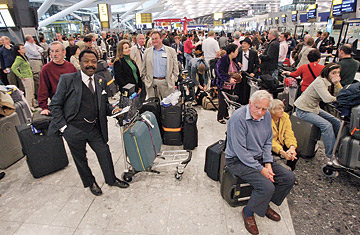
Heathrow's homeless have blended in amid its masses of stranded flyers.
It's a familiar scene: 3 A.M. at Heathrow Airport, and people are sprawled across plastic benches in various poses of contortion. To be in transit is to be disconnected, but for some of those sleeping here, the rootlessness is not temporary. Each night, scores of London's homeless men and women take advantage of modern travel delays by posing as stranded passengers in order to sleep in a warm, safe place. They play a cat-and-mouse game with police, often donning floral shirts, fanny packs and other travel accessories to blend in. And their increasing ability to disappear in Heathrow's swelling crowds of delayed passengers--bolstered last month by the glitch-plagued opening of a new terminal--has prompted the airport to try a new approach.
In February, Heathrow commissioned Broadway, a local homeless-outreach organization, to visit the airport once a week in order to survey its homeless population and try to coax them into alternative accommodations. In the first four weeks alone, Broadway conducted a hundred interviews with homeless people at the airport, and although the group spoke with some more than once, the number was far higher than expected.
One night in March, I joined Jeff Motunde, a Nigerian-born Broadway outreach worker, and police officers for a survey of Heathrow's homeless. Those contacted included a man sleeping under his coat, another conspicuously hiding behind an open newspaper, and a woman clutching a duty-free bag who insisted she was waiting for a flight, only to whisper when police were out of earshot, "I can't afford electricity. It's warm here. Please let me stay."
Like many legitimate travelers, Heathrow's homeless are in search of escape--from debts, from legal troubles, from family responsibilities. They often have mental-health or substance-abuse problems, and they often refuse help. During the day, some travel into London to beg, busk or take drugs, while others remain in the airport, scrounging food from sympathetic restaurant workers. "When I came from Africa, I couldn't believe people could be homeless in Britain," says Motunde. "But I discovered that homelessness is a way of life. It can be very difficult to convince people to change and receive help."
"Rough sleepers," as homeless people are known in Britain, are sheltering incognito at many of the world's major airports, says Sandie Cox of Heathrow Travel Care, the organization overseeing the one-year pilot scheme. Chicago's O'Hare instituted a homeless outreach in the 1990s. Several others, including Newark-Liberty in New Jersey and Los Angeles' LAX, have done the same. Heathrow, the busiest airport in Europe, has more delays than most major hubs; the catalog of errors accompanying the March 27 opening of the $8.5 billion Terminal 5--including some 250 canceled flights and 28,000 pieces of misplaced baggage--has provided even more effective camouflage for the airport's invisible underclass. Still, ingenuity is a necessity for Heathrow's homeless to avoid police detection, although options are often limited. "I thought about disguising myself as a passenger, but I have a bit of what you might call a luggage issue," 65-year-old Joseph explains, pointing to a shopping cart of bulging plastic bags. "They are hardly Louis Vuitton."
Of the half a dozen homeless who agreed to follow up with social care during my visit, it is possible that none will check into temporary accommodations, Motunde says. It's likely that many will stay at the airport until they are arrested or become ill. They are beneficiaries of the democratization of flight: gone are the days when you could identify British air travelers by their neat suits and shiny shoes. Two scruffy passengers we discovered curled in the corner of a remote bathroom turned out to be holding tickets to LAX. They had chosen their spot because it was the only place they could find that had an outlet to charge their handheld video-game console.
GLOBAL DISPATCH For a new postcard from around the world every day, visit time.com
